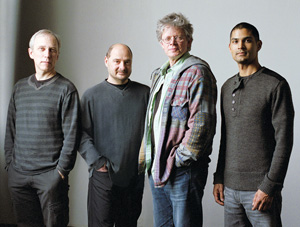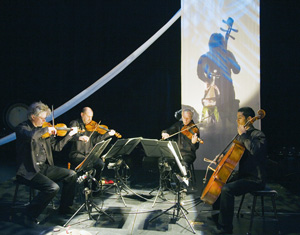

“IN CHINA, everything is used and reused. Nothing disappears, musically,” says David Harrington. The founder and artistic director of Kronos Quartet should know—he spent countless hours over three years listening to hundreds of musical works from all over China. It’s fair to say Harrington became obsessed with the making of the group’s newest piece, A Chinese Home, co-commissioned by Stanford Lively Arts, who will present its West Coast debut on Saturday.
The first collaborator Kronos chose was a natural for the project. The quartet had been working for almost two decades already with Wu Man, whom Harrington wanted not only for her famous command of the Chinese lute, but for her encyclopedic knowledge of the form.
“There’s no one I know whose knowledge of Chinese music and culture is so broad, but not hardened into a certain camp. She’s open to so many things,” he says.
But as the Chinese Home story—based on the real-life history of Yin Yu Tang, a 300-year-old Chinese house that ended up intact in Salem, Mass.—began to take shape, Harrington felt there was no way to get a handle on all the musical and visual ideas in his head. For the first time in the group’s 35-year-history, Kronos brought in a director. That it was acclaimed visual stylist Chen Shi-Zheng didn’t hurt. Suddenly, A Chinese Home, now made up of four parts and led into by composer Tan Dun’s Ghost Opera, became an expansive multimedia composition.
“It’s a very dramatic piece,” says Harrington. “It uses the entire stage, and there’s a real sweep to it.”
Despite the epic scale of the work—which burns across a musical landscape that includes the Chinese countryside, the Shanghai film industry of the 1920s, the cultural revolution and a finale that features pretty much every influence mixed together into one gigantic swirl of sound—Harrington had to admit, in the end, that some of his designs were simply too ambitious. He had, for instance, originally wanted the whole group to learn fluent Mandarin—a notion which probably helped his fellow Kronosians figure out that he was in way too deep.
And yet, as they were putting the finishing touches on the piece, Harrington discovered he needed a half hour of music to fill the time for set changes between Ghost Opera and A Chinese Home. That became a collage of all the musical ideas that he hadn’t been able to fit into the project, from train noises to sounds of Tibetan radio to the first recording made in China, in 1895. It was true, after all, that nothing disappears in Chinese music.
“That’s the approach we took,” he says, “that layers of culture and sound keep reappearing.”
The KRONOS QUARTET performs with WU MAN on Saturday, Jan. 16, at 8pm at the Memorial Auditorium, 551 Serra Mall, in Palo Alto. Tickets are $34-$60; 650.725.ARTS.


Review: Kronos Quartet
By Eric Johnson
Yin Yu Tang: A Chinese Home, which had its West Coast premiere at Stanford’s Memorial Theater Saturday night, is the most recent collaboration between the Kronos Quartet and Wu Man, master of the Chinese pipa. It was a success—but I’m glad Kronos and Wu decided to open the night with their first piece, 1995’s Ghost Opera.
Yin Yu Tang, conceived by Wu and Kronos’ first violinist David Harrington, is a fascinating multimedia trip through recent Chinese history. Its effect was powerful but its pleasures mostly intellectual. Ghost Opera, written by avant-gardeist-turned-film-composer Tan Dun (whose score for Ang Lee’s Crouching Tiger, Hidden Dragon won him an Oscar), is an experimental piece, a quasi ritual, apparently designed to blow minds. It’s probably just a matter of taste, but I tend to go in more for the mind-blowing than the edifying.
Part of what made the night so enjoyable overall was the novelty of hearing Wu show what she can do with the pipa, a guitar-size four-string zither that is played using a fancy technique of plucking and hammering. Ghost Opera seemed custom made to display Wu’s mastery. The piece is punctuated by silences, into which Wu would drop a single quavering note. At other times she played so fast it seemed impossible—employing the techniques known in Western classical music as tremolando and bisbigliando (“whispering”).
The new piece called on Kronos to flex its famously diverse skills—including the ensemble’s knack for theatrics. It opened with the band members walking (or dancing) in, one at a time, playing a folky tune which ultimately was developed as the piece’s thematic center. Before settling into their usual roles with their usual instruments, they took turns playing Chinese rattles and cymbals, as well as orchestrated vocalizations: musical exhalations and exclamations. When eventually they all settled in and fired up the violins, viola and cello, the familiar noise they produced was a pleasant shock.
Wu Man sang several songs throughout the evening—including ancient chants from the mountains and Westernized jazz tunes form the 1940s: her voice was a pleasant surprise. All in all, sharing the stage with one of the world’s leading ensembles, she stole the show.


